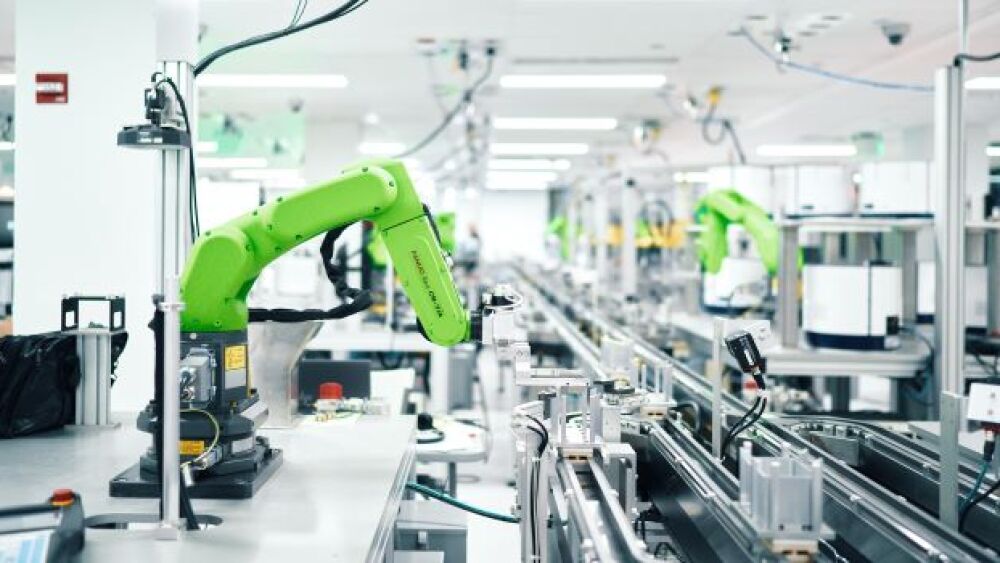Ginkgo Bioworks reported its 2021 financials today, and the $1.7 billion of stock-based compensation caught everyone’s attention.
Ginkgo Bioworks Lab/Courtesy Ginkgo Bioworks
Ginkgo Bioworks reported its 2021 financials Thursday, and the $1.7 billion of stock-based compensation caught everyone’s attention. In particular, two of the company’s executives, Jason Kelly, chief executive officer, and Reshma Shetty, chief operations officer, each received more than $364 million in compensation, although it was mostly in stock.
It would almost have to be in stock. The company reported total revenue for the fourth quarter of $148 million, a 363% year-over-year increase but a net loss for the fourth quarter of $1.6 billion, or $1.10 per diluted share. Its revenue guidance for full-year 2022 is between $325 million and $340 million. But at the end of 2021, the company reported cash of more than $1.5 billion.
In May 2021, Ginkgo went public via a special purpose acquisition company (SPAC), Soaring Eagle Acquisition Corp. A SPAC is essentially a company that raises money in search of companies to take public. They are sometimes also called “blank check companies.”
Gingko Bioworks dubs itself “the organism company.” It leverages microorganisms, such as bacteria and fungi, which it engineers across various markets. It began in the fragrance market, then expanded into food and agriculture, antibiotics, vaccines, therapeutics and enzymes. In November 2020, Ginkgo received a $1.1 billion loan from the U.S. government for COVID-19 testing and the manufacture of raw materials for potential therapies. It has expanded and made key acquisitions as well. For example, in 2019, it announced the Ferment Consortium, a private investment vehicle to fund Ginkgo spinout companies. Earlier in 2019, it acquired Warp Drive Bio’s genome mining platform.
The company has plans to add 60 new cell programs this year as part of its Foundry platform. This platform is slotted for half its revenue this year. The rest of the revenue will be from its SARS-CoV-2 monitoring program and biosecurity products and services. Analysts note that the company’s ability to meet 2022 guidance would depend upon what happens with the COVID-19 pandemic and that biosecurity “remains an uncertain business.” The biosecurity business is primarily COVID-19 testing.
The company notes in its annual report that its cell programs are its unit economics. For each cell program, they generate economic value in primarily two ways. “First, we charge usage fees for Foundry services, in much the same way that cloud computing companies charge usage fees for utilization of computing capacity or contract research organizations (CROs) charge for services. Additionally, we negotiate a value share with our customers (typically in the form of royalties, milestones, and/or equity interests) in order to align our economics with the success of the programs enabled by our platform,” the company said in a statement.
In terms of full-year financials, Ginkgo Bioworks reported $314 million in total revenue for the year, an increase of 309% over 2020. It added 31 new cell programs in 2021, representing 72% growth over the previous year. Ginkgo added 10 new programs in the fourth quarter alone. Foundry revenue was $34 million in the fourth quarter, and Biosecurity was $114 million. Foundry revenue was $113 million for the full year, and Biosecurity revenue was $201 million.
“The current market environment provides both challenges and opportunities, but I’ve never been more excited about Ginkgo’s future,” Kelly said. “We met or exceeded each of our publicly disclosed metrics in 2021, some significantly, and we believe we are in the strongest position that we’ve ever been in as a company.”
He went on to say, “I couldn’t be prouder of our team and the way they have shown up to build our platform and deliver cell programs for our partners over the past year. Some of the greatest challenges of our generation — including climate change and food security — are fundamentally biological. Ginkgo is unique in our relative scale and our focus on the development of broad-based horizontal technologies to make biology easier to engineer — and on humankind’s ability to do so responsibly.”





